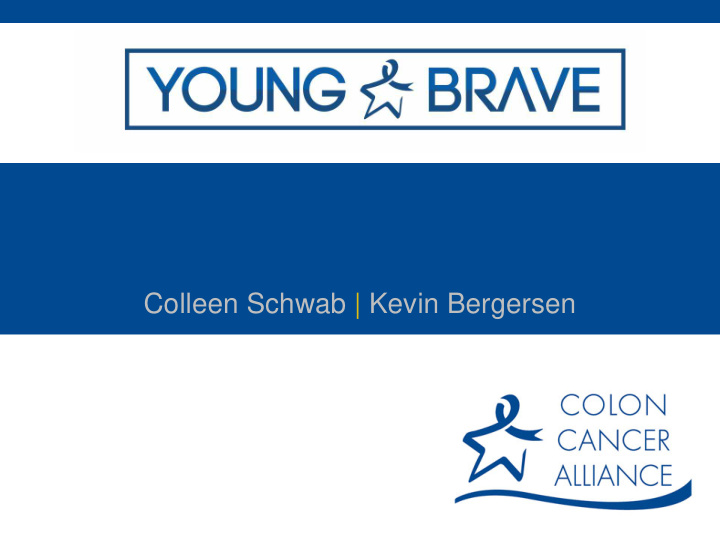



Colleen Schwab | Kevin Bergersen
Who gets colon cancer?
Marvin Arrivillaga • Diagnosed at age 36 with Stage IV Colon Cancer in March of 2014 • No family history • Father of two children (2-year old and 6-year old) • Misdiagnosed for three years
Vannora Hawkins • Diagnosed at age 25 with Stage IV Colon Cancer • No family history, negative genetic strand test • Lived healthy lifestyle • Misdiagnosed for 5 months with pelvic inflammatory disease and appendicitis
Alison Rosen • Diagnosed at age 31 with Stage II Colon Cancer • Risk factors present: • Ashkenzi Jewish heritage • Family history of Ileitis (grandfather) and Chron’s (mother) • Living with Colitis/Chrons since age 12. • Had yearly scopes
Presentation Overview • Introduction to Colon Cancer Alliance • The Trend Is Real • Promising Research • What You Can Do • Questions
Who is the Colon Cancer Alliance? Our mission and signature programs
Who We Are Our mission: Knock colon cancer out of the top three cancer killers. We are doing this by championing prevention , funding cutting-edge research and providing the highest quality patient and family support services .
Our Programs We serve more than 1.5 million patients and family members every year! Free Helpline: Buddy Program Monthly Webinars Financial Support (877) 422-2030 Peer-to-peer Third Wednesday Grants for screening and 1,000+ callers mentorship every month treatment assistance every month! Blue Hope Nation ccalliance.org Facebook community to connect, ask Chat live, learn more and questions, share your story 24/7 colon cancer FAQ
Patient Support Navigator Program 380 Requests for Navigator Support 6 Patients referred from: Navigators - American Cancer Society on Staff - Cancer Treatment Centers of America - CancerCare - Healthcare Providers 2015 Data
Patients and Families Count on Us
Blue Hope Financial Assistance “Thank you from the bottom of my heart. Unless you've been here, you have no idea what this means. It not only helps with gas to get to treatments - it's a real spirit lifter to know that there are such kind and caring people around us." - Marsha F. $300 Stipends 216 Awards Granted 2,618 Applications Received 2015 Data
#RUNBRAVE…in Phoenix! Scope It Out
The Trend is Real
Colon Cancer: The Facts
Colon Cancer Trends in Young Adults • Incidence is rising sharply in US younger adults, while it has been steadily decreasing among the over 50 population. • Annual percentage change in rates rose in patients aged 35-49 at diagnosis, but especially between 20-34 years of age. • Results were similar for both colon and rectal cancer.
Incidence Rates: Overall Trend Surveillance, Epidemiology, and End Results age-adjusted colorectal cancer incidence per 100,000 individuals in those: (A) younger than 50 years (B) 50 years or older
Incidence Rates: By Age Group Surveillance, Epidemiology, and End Results age-adjusted incidence per 100,000 individuals by age and year for: (A) colorectal cancer (B) colon cancer (C)rectal cancer
What does this mean? If the current observed trends continue between 2010 and 2030, incidence of colon and rectal cancer will increase by 90% and 124% respectively among 20-24 year olds and by 28% and 46% in 35-49 year olds.
Promising Research What we know now
Biological and Genetic Characteristics • Tumor location often occurs in the distal colon or rectum • Poorly differentiated histologic features • Typically associated with worse outcomes – present at advanced stages
Biological and Genetic Characteristics
Contributing Factors to Rising Mortality Rates • Late-Stage Diagnosis • Young (ages 20-40 years) Patients; Overall 5-Year Survival Is Poor • Patients & Physicians Contribute to Delayed Diagnosis. • Symptomatic Young Patients May Wait 6 Months Before Seeking Medical Care. • Symptomatic Young Patients Can Encounter Physician-Related Delays • Missed Symptoms • Initial Misdiagnosis (Occurs in 15%-50% of Cases)
Bottom line • "The increasing incidence of colorectal cancer among young adults is concerning and highlights the need to investigate potential causes and external influences such as lack of screening and behavioral factors," say the study’s authors. • They note that obesity rates have increased significantly in the United States, and obesity is a major risk factor for colon and rectal cancer. The study was published in the January 2015 issue of JAMA Surgery .
What Are We Doing?
Young and Brave • Colon Cancer Alliance’s initiative to bring awareness to the increasing trend of young onset colon cancer cases. • Focuses on highlighting the most up to date research, commemorating patients, and sharing their stories.
Never Too Young Coalition The Never Too Young Coalition is united to take on young-onset colorectal cancer through action, education and research.
Collaborative Effort • CRC Advocacy Groups • Comprehensive Cancer Centers • Major Research Institutes • State Health Departments • Researchers • Survivors, Caregivers & Patients
Top Priorities • Research – Research Through AACR Partnership – Webinar – Collaboration with Other Partners • EAO Conference • Joint Patient Research • Public Awareness/Education – Young Survivors Week – June 5-11, 2016 – Social Media – Website – National Colorectal Cancer Roundtable
AACR Research • Supported by Colon Cancer Alliance – Tatianna C. Larman, MD; Johns Hopkins University; Exploiting a common metabolic susceptibility in early onset sporadic CRC • Supported by Michael's Mission and the Chris4Life Colon Cancer Foundation – Sarah B. Stringfield, MD; University of California, San Diego; Young Onset Colorectal Cancer- A virally mediated process?
What You Can Do
Take Action • Join the Never Too Young Coalition • Patient Education – Know Your Family History – Know the Symptoms – Minimally, Demand a FIT Test • Provider Education – Ask Patients Family History – Know the Symptoms – Minimally, Give a FIT Test • Conduct or Help Fund Research • TAKE ACTION TODAY!
Save the Date November 11 – 13, 2016 Mesa, AZ A workshop for metastatic CRC patients and their family members Save the Date
ccalliance.org find us on Facebook
Recommend
More recommend